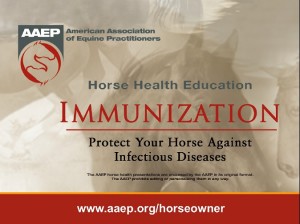Preventative Healthcare
A preventative medicine or wellness examination brings our years of experience and training directly to your farm for an expert eye on your horse. By examining your horse from nose to tail, we can identify subtle changes before they become a serious problem necessitating an emergency call. That’s why we stress the importance of regular vet visits to keep your athlete in peak performance and your beloved best friend happy, healthy, and sound.
A wellness exam includes a physical exam, body condition score and a nutritional consultation. We recommend an annual fecal exam with a targeted deworming plan as well. Blood work is recommended for any horse over 15 years of age. Last but not least, vaccines are a vital semi-annual part of the wellness plan.
Physical Exam:
Just like your Doctor recommends annual physicals, your horse should have one too. This comprehensive exam evaluates your horse’s vital signs and major body systems including: cardiovascular, respiratory, gastrointestinal, neurological, endocrine, musculoskeletal, integument (skin and haircoat), ocular, and urogenital systems.
Body Condition Score:
A body condition score is a scientific evaluation of your horse’s weight, taking into consideration any fat deposits. Excessive fat deposits increase the inflammation in the body and can be indicative of endocrine dysfunction like Equine Metabolic Syndrome or Pars Pituitary Intermediate Dysfunction (PPID formerly known as Cushing’s Disease).
Nutrition Consultation:
Take the guesswork out of feeding time and have our qualified veterinarians evaluate your current feeding protocol in the context of your specific horse’s needs. For example, a horse with Equine Metabolic Disease needs a very different nutritional program than a horse with Hyperkalemic Periodic Paralysis (HYPP).
Targeted Deworming:
Would your Doctor recommend switching antibiotics every other day for a cold? The newest research is showing that rotating dewormers every other month is causing parasite resistance, just like rotating antibiotics would cause bacterial resistance. We recommend an annual fecal exam and a consultation to develop a targeted deworming program for your horse or herd.
Blood work:
As our horses age, it is important to periodically evaluate their organ function to catch any dysfunction before it reaches a critical stage.
- Complete Blood Count: evaluates red and white blood cell quality and quantity
- Chemistry: evaluates organ function and electrolyte levels
- Fibrinogen: evaluates overall inflammation
Vaccinations:
A vital part of infectious disease control, vaccines keep your horses healthy and safe even when traveling away from home.
- Vaccines every horse should have annually include Rabies, Tetanus, West Nile, and Eastern/Western Equine Encephalomyelitis.
- Depending on your horse’s risk, other vaccines such as Equine Influenza, Equine Herpes Virus, Strangles, and others may be indicated.
- Vaccines are not all created equal, while some prevent disease others simply shorten the disease course if your horse gets the disease.
From the show ring to the field, Chicago Equine Medical Center is with you every hoof beat. We will advise you through the lifetime of your equine partner, from pre-purchase exam to elderly equine consults.















